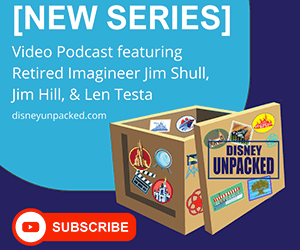Video Games & Technology
Though Epic Mickey 2 gets all of the Disney-related details right, it’s still somewhat frustrating for gamers

Epic Mickey 2 the Power of Two (EM2) is out now on multiple
consoles including the Xbox 360, Playstation 3, Wii and Wii U. The game
deserves special consideration for readers of JHM because it is layered with
several generations worth of material from the Disney Archives, theme parks and
film library. The world of Epic Mickey, or "Wasteland" is so
saturated with history that it could catch trivia specialists flat-footed.
Warren Spector, lifelong Disney fan and creator of the game had said at the San
Diego Comic Con that he wanted to create a world with substance. He did not
want to have gamers dig underneath the surface and discover that the Wasteland
was like other games. His studio Junction Point succeeded in doing just that.
In some areas of the game when Mickey Mouse dissolves the walls and floors of
the world players can actually see the blueprints. The grey paper of the
imagination with penciled out blue lines created by the great architect Yen Sid
himself. The feeling that players come away with is more than a wash of
nostalgia, it is almost indescribable. Players may recognize a piece of art
hanging on a wall or a radio standing in the corner of Mickey Mouse's home
exactly as it appeared from the 1936 film Thru the Mirror. Players are not only
visiting the home from the film, they are now interacting with it. They are
walking around in his kitchen, jumping on his furniture if they choose to.
Players then begin to peel away at the walls and floors only to find there is
another world beyond, waiting to be explored. The game is filled with these
"a-ha!" moments In addition to
capturing the details and minutiae from the Disney legacy the game gives
audiences a fresh perspective on the iconic Mickey Mouse without betraying the
character. The amount of work that went into the game is staggering. Disney is
trying to make Mickey and his friends relevant again in the new media and are
sparing no expense in making that happen.

Copyright Disney Enterprises, Inc. All rights reserved
I've spent the past two weeks with fellow gamer Alice Hill
going over the game on multiple consoles. The game has average difficulty for
seasoned players but is moderately difficult for younger gamers. The main
portion of the game is long but can still be beaten over the course of a
weekend by experienced players. In order to get the full experience however a
player has to explore every inch of the Wasteland, collect hidden items and
accept side-mission that enhance the story and extend the gameplay to dozens of
hours. The best way that Alice and I could review this game was by playing it on
the different platforms in single and multiplayer modes and trying different
options and paths. If you are interested in purchasing the game and do not want
to read the spoilers then here is a one sentence review… Epic Mickey 2 is a
good game but its faults prevent it from reaching true greatness. For those
that want to know how we came to that conclusion please keep reading.

Copyright Disney Enterprises, Inc. All rights reserved
The camera was a major sticking point in the original game,
the new camera system is much more user friendly, it follows the action better
and can be moved with more precision. The camera and control really shine on
the PS3 and Xbox 360 using the regular controllers. It was still a chore to use
motion-based controllers in the game, and doubly so when in 2-player mode. The
limited screen space and drawbacks of the motion controller were apparent when
playing on the Wii and PS Move. We constantly had to keep realigning the camera
to line up our targets, not to mention it was harder to perform double team
moves on the Wii than the other consoles. Alice and I would not recommend
getting the sequel on a different console if available. Those that do have the
Wii can at least play using the cool new light-up peripherals, a paint brush
and remote control available for Mickey and Oswald respectively. Visually the
game was stunning. The lighting, animation, and effects featured in the new
game were better than the original. Characters cast shadows, light bounced off
of objects and refracted or reflected realistically. Junction Point made good
use of the new physics engine as well. Items had weight, paint and thinner
flowed convincingly and objects dropped as they would in the real world. These
things were put to use on the new levels created for the game. Environments
that collapsed remained that way for the rest of the game. Players were warned
early on that all decisions they made would have consequences and could
ultimately effect the outcome of the game. The level design was as good as the
original game, albeit some of the best "Lands" or attractions like
Lonesome Manor were featured only in the original title. The scale of the
levels was much larger in this game, but like the first game they maintained an
incredible amount of planning and detail. Exploration was rewarded with items
that could be used in game, pins to collect or even costumes for Mickey and
Oswald to wear. There were many details pulled from the parks, movies and even
television shows which would appeal to even the most jaded Disney fan. Where
else could a fan visit the Rainbow Caverns, fight a robot modeled after
V.I.N.CENT from the Black Hole and wear a Tron costume?

Copyright Disney Enterprises, Inc. All rights reserved
Players could travel from land to land using film
projectors. The side-scrolling levels used the setting of a classic Disney film
and allowed both Oswald and Mickey to explore, interact and even combine
resources to get through the stage. The projectors were featured in the
original game as well and contained some of the most memorable experiences.
Some of the sequences in EM2 include the Old Mill, Night on Bald Mountain, the
Skeleton Dance, Music Land and Building a Building. A second side-scrolling
component has also been added. Mickey and Oswald can now navigate the Dahl
Engineering Corridors or D.E.C., a series of underground tunnels that connect
the remote areas of the Wasteland. The tunnels were named after Gremlins
creator Roald Dahl but based on the Utilidoors from Walt Disney World. Each
D.E.C. is made up of junk from the Wasteland, of course junk to the residents
are actual antiques and merchandise from company history. Look carefully for a
tape, doll or record that you might have in your collection!

Copyright Disney Enterprises, Inc. All rights reserved
This game also features actual voices for the main and
supporting characters instead of the text boxes and generic grumbles used in
the original. Veterans Bill Farmer (Goofy), Tony Anselmo (Donald Duck), Tress
MacNeille (Daisy) and Jim Cummings (Pete) are joined by Bret Iwan the new voice
of Mickey, Dave Wittenberg as the Mad Doctor, Frank Welker as Oswald and Cary
Elwes as Gus the Gremlin. The supporting cast made up of Gremlins and forgotten
monochromatic characters also have their own unique voices. Most blended well with the main characters. The
opponents consisted of Blotlings, Beetleworx and Blotworx. Those original creations
were made of animated ink blots, machines or a combination of the two. They did
not have any voices per-say, mostly grunts or screams. Three additional classic
animated characters appear in game if a player searches high and low for them.
The Three Little Pigs are trapped in Wasteland and have Mickey try to help
them. Fifer and Fiddler Pig sing with the exact high pitched voice and even
rhyme and meter from the old cartoons. Practical Pig maintains his raspy voice
and serious demeanor as well. Whomever voiced the characters was spot-on. Not
all of the voice acting was great however. Some of the residents of Mean Street
seemed out of place. Listen for the surfer and overdone Caribbean accents. The
stand-out character and voice for EM2 goes to Ian the ghost. His gruff but
friendly "Hey Boss!" was a welcome addition to the cast. He was in
the first game and originally appeared in the Lonesome Ghosts short. Ian
challenges the player to mend the relationships between the citizens of the
Wasteland, the Blotlings and Mickey. His was the best developed new personality
in the game. A close second would be the robot A.B.E. He is a curator to the
diorama museum and can best be summed up as Jimmy Stewart-meets-Tom Morrow. The
addition of color characters in the Three Pigs contrasted the black and white
citizens of the Wasteland and animatronic representations of Daisy, Donald and
Goofy. The addition of cartoon stars other than Mickey is creating precedence
for combining the toon and park worlds, these things may be expand upon in the
next Epic Mickey title. Hopefully Ian and A.B.E. will be featured more
prominently if that happens.

Copyright Disney Enterprises, Inc. All rights reserved
The greatness that Junction Point was going after began to
break down when we stopped watching, stopped looking at the details and started
playing. Epic Mickey was promoted as the first gaming musical. The plot was all
told through song so technically Disney was right. However the Mad Doctor had
all of the singing parts with one line reserved for Oswald. The gravely voice
did nothing to make the character sympathetic or pull on any nostalgia strings.
Imagine seeing the Little Mermaid but only Scuttle the seagull could sing the
parts. It was an odd decision considering that the Mad Doctor was used only
once by Disney and was allowed to fall into public domain. None of the songs were
truly memorable which was odd considering that the music was written by James
Dooley. The television and movie composer wrote an amazing score for the first
game, X-Play deemed it the best Soundtrack in 2010. Disney never released a
physical album of the first game but did make the music available via iTunes.
Many players reported crying when they heard the original end credits. The
original soundtrack worked on may levels whereas the new soundtrack felt
lacking. It was not all bad though. The audio cues in the game were put to good
use. When a player was thinning or painting the Wasteland the music on the
level signaled whether a good or bad decision was being made. If players
listened carefully to the choices being presented by the other characters in
the game they could be prompted to make the right choice. Each level could be
passed in multiple ways, some of the cues are obvious while others are well
hidden. While playing in two-player mode several set pieces, particularly boss
battles, were not triggered properly if at all. Gus the Gremlin would chime in
and give us a hint over and over but nothing we tried would trigger the set
piece. In other cases either Mickey would get stuck in an object or Oswald
would fall through the floor and be unable to rejoin Mickey. This frustrated us
to no end. For the minor glitches we would quit the game and then restart it.
For the larger issues we had to turn off the system and go back later in the
day. When we returned to the game the set piece would load properly and we
could finish the stage. In several instances we ended up doing the
"wrong" thing to finish the stage because the correct option did not
load or would not respond to our attempts.

Copyright Disney Enterprises, Inc. All rights reserved
With two players working independently the majority of the
game was very easy. Fighting or befriending enemies was much easier this time
around as was compared to the solo battles in the original game. When the set
pieces did not load, or when only Player 1 (Mickey Mouse) could trigger an
event then it made the game far more difficult. The majority of the game moved
quickly for two players, if they were not performing any side missions. The
gameplay was smooth and intuitive, as good as most action platformers. The
majority of battles were well balanced if not easy as well. Very often however
the gameplay would change suddenly into a slow, grating experience. The battles
would become extremely difficult and feel very redundant. It would feel like an
insult to the players when their progress was suddenly halted. For example Gus the
Gremlin would drop the same hint over and over if a puzzle wasn't solved within
a set amount of time. He would not offer alternative strategies. When fighting
a boss encounter Gus would offer a clue to defeating it. Even if the player
used the proper strategy Gus would continue dropping the same hint again and
again. This was particularly annoying when a set piece or boss encounter did
not load. There was nothing we as players could do about it unless we turned
off the console or deliberately made the wrong choices. In at least one case
just wandering around the level, not interacting with characters or the
environment triggered a bad outcome. Alice said that it felt like we broke the
game, which was alarming since we had only been playing it for a couple of
days. Disney boasted that during the development they had near 600 employees
working around the world in different countries. The sun never set on the
production of EM2. Spreading the talent and workload over several timezones
meant that something was destined to fall through the cracks. Perhaps the QA
testers focused the majority of their efforts on the 1-player experience and
did not go over the 2-player mode with a fine tooth comb. Or perhaps Junction
Point did not consider what elements would have to be changed if gamers wanted
to experience 2-player mode the entire way through. Even in the single player
attempts that we tried it seemed that the computer-controlled Oswald slowed
down the experience and in certain portions made the game more frustrating than
it should have been. The encounters and choices we made permanently affected
the outcome of the game, as promised by Warren Spector earlier this year.The
good or bad sequences would play during the credits. The endings varied
depending on the choices made in game. Even though Alice and I had gone out of
our way to try to make nothing but good choices we had amassed a melancholy
string at the end of our first play through.

Copyright Disney Enterprises, Inc. All rights reserved
In the past two weeks Alice and I have found ourselves more
frustrated than pleased with the game. We enjoyed the world that Junction Point
created, the details that they filled the game with, the pins, costumes,
wonderful personalities and experiences. However there is a difference between
looking at the game and playing it. Pulling the experience out of EM2 was a
chore. The story felt lacking and disconnected. The fear of Oswald being
forgotten again was not fleshed out, why Prescott the Gremlin felt
unappreciated and how the Mad Doctor set him up and then brainwashed him was a bit
deus ex machina. Despite everything added to the game, including the voices, we
did not feel as connected to the story as we did with the original game. Other
comparative "epic" experiences like God of War, Shadow of the
Colossus and Zelda did not feel broken. The player felt rewarded for exploring
those games. They did not have set pieces that failed to load or a hint system
that kept interrupting the player or insulting their intelligence. Gamers did
not feel like they were being punished for missing an item or making a bad
decision. In EM2 we were frustrated with some puzzles, boss encounters and even
backtracking. For example, the studio broke Mean Street, the Wasteland version
of Main Street in two, which meant we had to spend more time traveling through
the lands for simple tasks. We wanted to enjoy the game, we really did but
several times we were so put off by the game that we swore we would never play
it again. We calmed down after a day and tried but the experience felt
redundant rather than rewarding. We wanted to say that the game was better than
the original but we didn't know if that was a completely true statement. Epic
Mickey 2 is not for everyone and that is partially why we say it was good but
not great. Those that are willing to slow down their gaming experience,
carefully consider the needs of Wasteland residents and revisit locations to
search for hidden items will be rewarded. Those that just want to play through
a game and feel good about it in the end may need to look elsewhere.
Video Games & Technology
“Adventure Time: Pirates of the Enchiridion” game coming this summer

“C’mon on, grab your friends … ” A new Adventure Time game is coming out across multiple platforms.
 Copyright Cartoon Network / Outright Games Ltd. All rights reserved
Copyright Cartoon Network / Outright Games Ltd. All rights reserved
In this open world game, Finn and Jake will be sailing on a raft (Named Jeff) through the flooded land of Ooo to solve the mystery of why water engulfed their home and to help others & get in hijinks along the way. With a ragtag gang of friends (From a vampire, to an Ice King, to a little robot) Finn and Jake will travel from the melting Ice Kingdom to the Fire Kingdom and fight in turn-based combat like an RPG.
 Copyright Cartoon Network / Outright Games Ltd. All rights reserved
Copyright Cartoon Network / Outright Games Ltd. All rights reserved
The trailer shows off some absolutely gorgeous character models and environments. I’m particularly enchanted by the gorgeous Candy Kingdom that’s briefly shown in this footage. The art design sticks close to the show, but brings with it a soft, sweet design rarely seen in adventure games. Which is a refreshing thing to bring to the table. Likewise, it’s a joy to see the characters translate to 3D so well. Outright Games has done some fantastic work here with their art design.
 Copyright Cartoon Network / Outright Games Ltd. All rights reserved
Copyright Cartoon Network / Outright Games Ltd. All rights reserved
Likewise, the voice cast for the show will be reprising their roles as characters in the land of Ooo. And they’ll have a lot of lines to record. Not only can you control Finn and Jake, but you’ll be able to play as BMO and Marceline as well. You can upgrade these characters to unlock unique abilities for combat and the map holds plenty of fun mysteries too. With side stories and secret locations, this seems like a game that’ll have hours & hours of fun.
 Copyright Cartoon Network / Outright Games Ltd. All rights reserved
Copyright Cartoon Network / Outright Games Ltd. All rights reserved
What strikes me particularly about this game is how much it resembles Legend of Zelda: Wind Waker. This is no coincidence. Adventure Time have a history of being direct corollaries to Legend of Zelda games. “Adventure Time: Hey Ice King! Why’d You Steal Our Garbage?!” ‘s gameplay references “Zelda II: The Adventure of Link” and “Adventure Time: The Secret of the Nameless Kingdom” has the same top down look & combat stylings as “Legend of Zelda: A Link to the Past.” With this in mind, it’s absolutely delightful to see a Wind Waker homage with a series like this. Wind Waker was a gamechanger for the Legend of Zelda series, and it feels like “Pirates of the Enchiridion” will be a gamechanger for the Adventure Time games.
 Copyright Cartoon Network / Outright Games Ltd. All rights reserved
Copyright Cartoon Network / Outright Games Ltd. All rights reserved
‘Adventure Time: Pirates of the Enchiridion’ will be out July 17th for the Nintendo Switch, Xbox One, Playstation 4, and PC.
Video Games & Technology
Do you like treasure hunting and/or cooking soup? Then Pokemon Quest is the game for you

Immediately after the Pokemon press conference on May 29th, the mobile-switch cross platform game Pokemon Quest was available to download on the Nintendo eShop (with the mobile device version debuting later this month). Curious about the ‘Free-to-Start’ game, I snagged a download and started playing.
 Copyright 2018 Nintendo. All rights reserved
Copyright 2018 Nintendo. All rights reserved
Pokemon Quest is a game that feels best letting itself auto-run. You check in several times a day to see what Pokemon have appeared at your camp (The conceit behind this game is that you’re a treasure hunter & Pokemon flock to you to fight their brethren in your honor. They also sometimes just come by because you make really good soup. What can I say?). With the Pokemon at your disposal, you build a small exploration team much in the same style as the Pokemon Mystery Dungeon game series. And you then set them out to fight other Pokemon in open levels. From these battles, you win power stones (which allow you to upgrade your Pokemon’s health & attack power), and ingredients to lure other Pokemon to your camp.
You may’ve taken notice use of the term ‘Free-to-Start’ earlier in this article. That’s because — like many mobile services — this game offers add-ons for purchase. I don’t see any age limit on the Nintendo Switch version to take away ads for purchases (which many mobile games have chosen to add. See Disney’s own ‘Disney Crossy Road’) but the Pokemon Company may be expecting parents to set their own controls over the switch with the parental controls available on the system.
 Copyright 2018 Nintendo. All rights reserved
Copyright 2018 Nintendo. All rights reserved
Still, the game is typical in mobile game fare for trying to wring money out of players. Energy to play the game costs P tickets, which you can earn 50 a day … or you can just buy. The game gives you an amount to start with, shows you how to use them to speed up your game, and then takes you to the shop where you can see an advertisement to buy it — along with Pokemon furniture to help your team.
These packages can go up to $30 and include Pokemon in-game items & exclusive furniture. And while Pokemon Go offered items in bundles like this, it’s still odd to see in a Pokemon game — let alone a Pokemon game on the Nintendo Switch (albeit, this is a cross-platform game). The game itself doesn’t seem to have any sort of hard-pay line for gameplay, though. I’m up to the fifth world in my game without making any purchases. And while the game difficulty has dramatically ramped up, likely to encourage purchases, it’s still completely manageable to play without paying.
 Copyright 2018 Nintendo. All rights reserved
Copyright 2018 Nintendo. All rights reserved
In that sense, for a free game, it’s really cute & enjoyable. The graphics are pleasing and colorful. And if you return to camp, you’ll find all the Pokemon you’ve befriended hopping around adorable decorations. Sometimes stacking on top of each other, other times following each other around in what seems like games of tag.
The ‘cooking’ mechanic to encounter a random Pokemon makes encountering them feel less like gambling and more like strategy. By cooking certain recipes from materials you find on missions, you can draw certain types of Pokemon to your camp. Cooking in certain pots (unlocked by playing through the game) can draw higher powered Pokemon at the cost of more materials. And waiting while your energy fills up means running out of ingredients (At the point of the game I’m at, about half-way through) doesn’t seem to be a problem.
 Copyright 2018 Nintendo. All rights reserved
Copyright 2018 Nintendo. All rights reserved
All in all, I’d say, if you have access to this game, check it out and see if it’s for you. There doesn’t seem to be cross platform support for other Pokemon games. But as a standalone, it’s a cute, fun blip of a game. The hard ‘end’ of the levels within surprises me, especially since it seems to end with 150 Pokemon (out of the over eight hundred available). So I’m not sure what there is to get out of it when you get to the end level outside of getting every Pokemon. But it’s still a fun, very casual strategy game. Just keep an eye on purchases if your children decide to play.
Video Games & Technology
“Pokemon — Let’s Go, Pikachu !” & “Pokemon — Let’s Go, Eevee !” to come to the Nintendo Switch this year

During a conference in Japan earlier this week, the Pokemon Company revealed three new games : A mobile and Nintendo Switch cross platform game, “Pokemon Quest,” with graphics similar to Crossy Road and some absolutely adorable furniture in a “free to start” format; and for the Nintendo Switch, “Pokemon — Let’s Go, Pikachu !” and “Pokemon — Let’s Go, Eevee !”
Taking inspiration from gameplay styles from the popular “Pokemon Go” for mobile devices, “Pokemon — Let’s Go, Pikachu !” and “Pokemon — Let’s Go, Eevee !’ adopts the thrown Pokeball system. By using one controller with the Switch system, you can make a tossing motion to throw a Pokeball and capture a cute critter for your team.

Additionally, you can buy the “Pokeball Plus” accessory to act as an additional “Joy-con” controller for your Switch to capture Pokemon. Then load a Pokemon into your pokeball, and take it out on the go.
From there, with the accessory, you’ll be able to interact with the Pokemon you have inside. Although current information doesn’t offer whether we’ll have more options than putting Eevee or Pikachu in the Pokeball Plus, the footage seen in the linked trailer is absolutely adorable.
The game itself seems to be a remake of Pokemon Yellow, a game released twenty years ago for the Game Boy Color. You explore the Kanto Pokemon region, and seem to be limited to the 150 Pokemon available when that game was out (Well, 151, if you were lucky, or good at exploiting glitches). But these games ditch the random encounters of mainline Pokemon games and adopt the overworld encounters of Pokemon Go. What Pokemon you see on the overworld is what you get.

Additionally, Pokemon can follow you around and you can ride some of them. In footage, we see a trainer riding a giant Onyx (i.e., a giant snake made out of rocks. Who wouldn’t be comfortable riding on that?) and followed by a starting Pokemon, Bulbasaur. Although in these two games, you start instead with the series mascot Pikachu, and the evolution Pokemon Eevee, which can evolve into several different pokemon. You can also put little outfits on them. Which is – frankly — incredible.
Likewise, this seems to have local multiplayer. Hand the left Joy-con to a friend and let them enter your game. Or if you’re feeling really lonely, put the left Joy-con in your hand and pretend you have a friend while controlling the new trainer that arrives. What a fun time!
You and your friend can then team up to capture Pokemon together, or go exploring together- And you can have Pokemon you capture in Pokemon Go (of the original 151 Pokemon) arrive in your game. You can also send “Presents” back to your Pokemon Go game, including a possible new form of Pokemon as the trailer discusses.

“Pokemon — Let’s Go, Pikachu !” and “Pokemon — Let’s Go, Eevee !” will be arriving on the Nintendo Switch this November. Likewise, a new Pokemon game will be released in the second Half of 2019. With a Mario movie in development and theme park additions on the way, it’s sure to be a busy year for Nintendo.
-
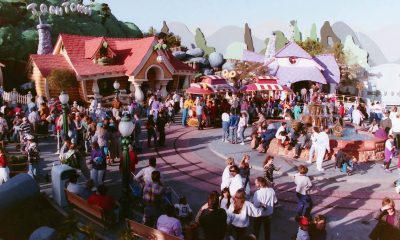
 History10 months ago
History10 months agoThe Evolution and History of Mickey’s ToonTown
-

 History11 months ago
History11 months agoUnpacking the History of the Pixar Place Hotel
-
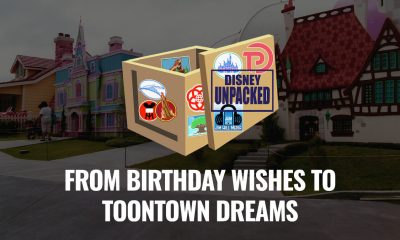
 History11 months ago
History11 months agoFrom Birthday Wishes to Toontown Dreams: How Toontown Came to Be
-
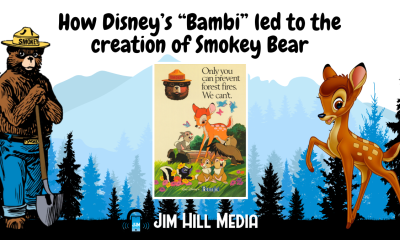
 Film & Movies8 months ago
Film & Movies8 months agoHow Disney’s “Bambi” led to the creation of Smokey Bear
-

 News & Press Releases10 months ago
News & Press Releases10 months agoNew Updates and Exclusive Content from Jim Hill Media: Disney, Universal, and More
-
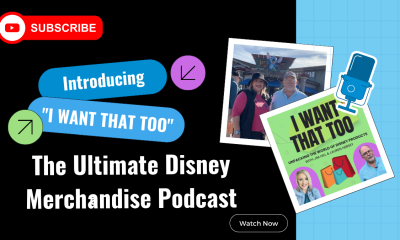
 Merchandise8 months ago
Merchandise8 months agoIntroducing “I Want That Too” – The Ultimate Disney Merchandise Podcast
-
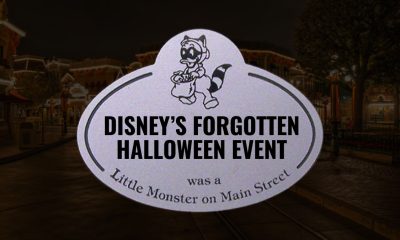
 Theme Parks & Themed Entertainment3 months ago
Theme Parks & Themed Entertainment3 months agoDisney’s Forgotten Halloween Event: The Original Little Monsters on Main Street
-

 Film & Movies3 months ago
Film & Movies3 months agoHow “An American Tail” Led to Disney’s “Hocus Pocus”

